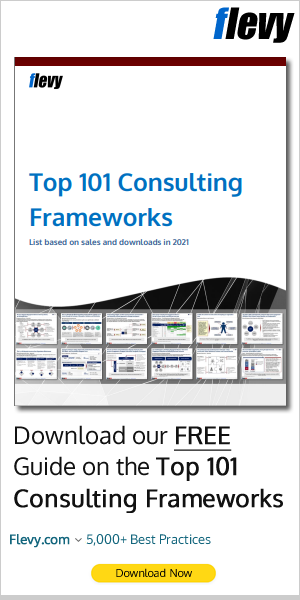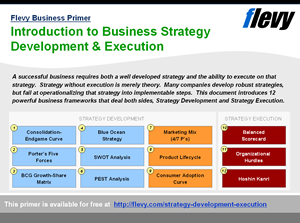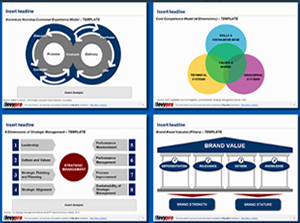Editor's Note: Take a look at our featured best practice, Digital Transformation: Artificial Intelligence (AI) Strategy (27-slide PowerPoint presentation). The rise of the machines is becoming an impending reality. The Artificial Intelligence (AI) revolution is here. Most businesses are aware of this and see the tremendous potential of AI. This presentation defines AI and explains the 3 basic forms of AI: 1. Assisted Intelligence 2. [read more]
How Your Business Can Benefit from RPA
Also, if you are interested in becoming an expert on Digital Transformation, take a look at Flevy's Digital Transformation Frameworks offering here. This is a curated collection of best practice frameworks based on the thought leadership of leading consulting firms, academics, and recognized subject matter experts. By learning and applying these concepts, you can you stay ahead of the curve. Full details here.
* * * *

1. Improve Efficiency
Human efficiency is no comparison to RPA. While a human workforce will work only a certain number of hours a day, with the need for breaks, vacations, sick days, and off days, RPA can work up to 24 hours a day, 7 days a week, and 365 days a year.
RPA, at its best, can comfortably take on work that would ordinarily require three to five employees working manually. For instance, a manual report that would take your staff 4 hours to create would take that same employee, using an RPA bot, 20 minutes to generate.
2. Improved Accuracy
Humans are prone to making mistakes and errors. Therefore, even in the workplace, allow room for errors and mistakes. While it is common to make mistakes, these can ultimately prove costly to your business. Besides, the part of manually working backward to rectify errors can be a time-wasting and arduous task. Backtracking is another problem that RPA solves for you.
RPA improves accuracy levels, timeliness, and flexibility of data collected. A crucial element in the success of implementing an RPA is to train your staff well on how to operate the software and technology. To experience management benefits, your company should thoroughly test the software to identify and override any bugs, and you are all set.
3. Cost Saving
With RPA, you can save as much as 50% of what you spend on operational expenditure. The reason is that you will be in a better position to eliminate, or at the very least, reduce, repetitive and mundane workplace tasks. RPA can control your IT systems, emulate human actions, interpret applications, etc., at high speeds and levels of efficiency. So, allows you to improve productivity and cut down on your workforce, office space, and other similar costs.
4. Enhanced Safety
One challenge of operating a business in a highly competitive market is the common occurrence of data leaks and breaches. These leaks and violations are other problems that RPA solves effortlessly. With RPA, your staff can program and maintain RPA parameters to document, access, and manage data with few human touchpoints, thus reducing leakages.
5. Better-quality Customer Experience
You can probably attest that customer demands vary from one end of the pendulum to the other. So, it is increasingly proving more challenging to address all your customer service requirements. However, once you adopt RPA, you can leave the repetitive, routine, and dull tasks to the robots. Your employees will have more time to concentrate on and address customer needs. Automated processes will give your employees better insight into customer needs and help them identify trends.
6. Improve Analytics

Conclusion
The face of the business world is gradually shifting from administrative methods of business production management to robotics process automation technologies. Therefore, it would be a step in the right direction for your business to embrace this change and begin the move into a more tech-centric model.

Want to Achieve Excellence in Digital Transformation?
Gain the knowledge and develop the expertise to become an expert in Digital Transformation. Our frameworks are based on the thought leadership of leading consulting firms, academics, and recognized subject matter experts. Click here for full details.
Digital Transformation is being embraced by organizations of all sizes across most industries. In the Digital Age today, technology creates new opportunities and fundamentally transforms businesses in all aspects—operations, business models, strategies. It not only enables the business, but also drives its growth and can be a source of Competitive Advantage.
For many industries, COVID-19 has accelerated the timeline for Digital Transformation Programs by multiple years. Digital Transformation has become a necessity. Now, to survive in the Low Touch Economy—characterized by social distancing and a minimization of in-person activities—organizations must go digital. This includes offering digital solutions for both employees (e.g. Remote Work, Virtual Teams, Enterprise Cloud, etc.) and customers (e.g. E-commerce, Social Media, Mobile Apps, etc.).
Learn about our Digital Transformation Best Practice Frameworks here.
Readers of This Article Are Interested in These Resources

|
|
321-slide PowerPoint presentation
|
|
Excel workbook
| |||
About Shane Avron
Shane Avron is a freelance writer, specializing in business, general management, enterprise software, and digital technologies. In addition to Flevy, Shane's articles have appeared in Huffington Post, Forbes Magazine, among other business journals.
Top 10 Recommended Documents on RPA
» View more resources RPA here.
» View the Top 100 Best Practices on Flevy.













